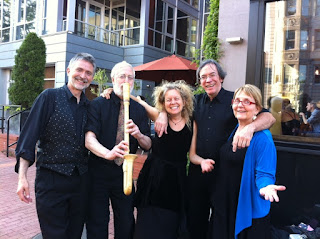Indianapolis Early Music celebrates its first half-century with a deep bow to music in Shakespeare
 |
| Mark Cudek (second from right) and the Baltimore Consort |
This explains why music is often incidental in Shakespeare's plays, welling up from characters in several of them, usually in comical moments. These tunes, in sung and instrumental versions, were carried around in the heads of the populace, like modern pop songs, as Canby goes on to note. Thus, they typically connected to the public through arrangements and were more identified by their titles than their composers or arrangers.
It's a rich field for the Indianapolis Early Music Festival to harvest in opening its 50th-anniversary season as it did Friday night at the Indiana History Center. "If Music Be the Food of Love" brought together the Baltimore Consort of artistic director Mark Cudek and two actors from Indiana Repertory Theatre, Rob Johansen and Milicent Wright (dramaturg Richard J. Roberts was also on hand to contribute to the preconcert talk).
 |
| Danielle Svonavec |
Sad songs lift the heart, as the servant Peter tells the band, singing "When Griping Grief" amid his labored teasing. The minor character is identified in a quarto version of "Romeo and Juliet" as Will Kempe, star clown of the Chamberlain's Men company until 1600, when he joined a rival troupe.
The brief scene shockingly relieves the dolor of Juliet's funeral preparations, another indication that music may come unbidden in unusual circumstances. The song itself is apropos, but the scene is rife with jokes and puns that harass the musicians. The dialogue was well staged Friday, then Svonavec sang the song affectingly. Johansen was particularly suited to the Kempe-ish clowning, but elsewhere managed the serious speeches competently.
He was believable, at least in the short run, as Hamlet, questioning the droll Gravedigger in an excerpt from Act 5, then musing aloud about the court clown Yorick, whose skull the Prince cradles in one hand in the most iconic Shakespearean image. I've never thought of the determined, vengeance-seeking Hamlet as likely to be so close to tears in this solemn reminiscence, but the case Johansen made for a weepy hero was intriguing nonetheless.
The Gravedigger, also a punster like Peter, but more philosophical, reflects a change in clown actors
 |
| The Bard knew his notes. |
There was of course a wealth of original music, much of it intended for home use, produced in Shakespeare's time. John Dowland was among the handful of distinguished composing contemporaries. As always, it was a treat to hear Ronn McFarlane's pristine lute playing, as in Dowland's "Fancy," a solo, and in the virtuoso elaboration he gave to the ensemble's propulsive performance of the same composer's "King of Denmark's Galliard," a truly "swift and wandering dance," in Sir John Davies' poetic description.
Lute and Cudek's bass viol strumming (which Peter would likely have punned upon as "base, vile strumming") opened the cumulative spiritedness of "Peg a Ramsey," an example of the way popular tunes were gathered in anthologies in an era when no other means of wide distribution were available. Another effective arrangement drawing from a late 16th-century anthology was "Fortune My Foe," its gloom enunciated at the outset by two viols, with flute and lute joining soon after.
Among Wright's features was an uproarious bit as the music teacher in "The Taming of the Shrew," smashingly dismissed by the (offstage) title character, returning to the prospective "tamer" Petruchio (Johansen) wearing a caved-in lute on her head. In contrast, she was moving as Desdemona on her fatal night, requesting "The Willow Song," a lovely showcase for Svonavec. Among the most memorable of Elizabethan songs, its drooping phrases imitate the tree, a longtime symbol of mourning, in a manner that would later be matched ("Salce, salce") in melodic contour and quality by Giuseppe Verdi in "Otello."
When in his cups Sir Toby Belch at Olivia's house in "Twelfth Night" (after enjoying the singing of "O mistress mine," which was also on Friday's program) launches into a couple of songs on his own, he draws the compliment: "Beshrew me, the knight's in admirable fooling." To which his dissipated buddy Sir Andrew Aguecheek replies: "Aye, he does it well enough if he be disposed, and so do I too. He does it with a better grace, but I do it more natural."
In "If Music Be the Food of Love," the Baltimore Consort and their actor collaborators combined the best of both knights. They performed with good grace — and they did it natural as well.



Comments
Post a Comment